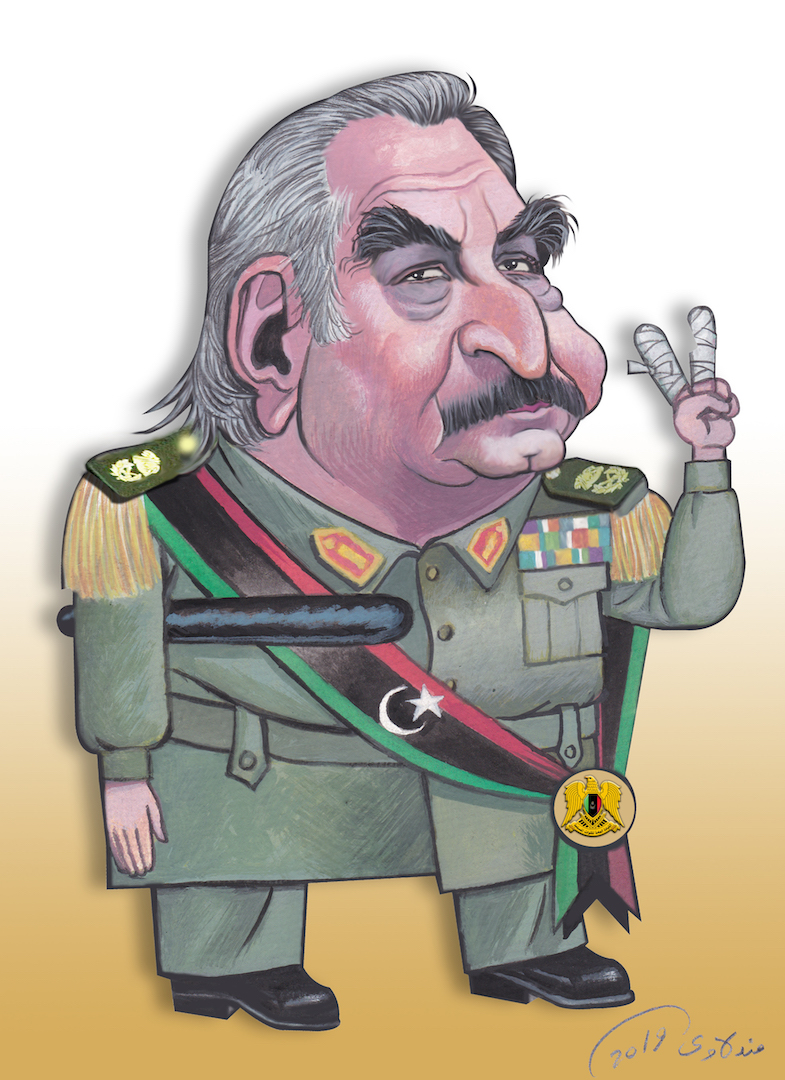
Born in 1943 in Tarhouna, Libya, Haftar was one of the group of officers led by Col Muammar Gaddafi which seized power from King Idris in 1969. He took part in the Libyan contingent against Israel in the Yom Kippur War of 1973. Gaddafi put Haftar - recently promoted to field marshal - in charge of the Libyan forces involved in the conflict in Chad in the 1980s. In 1987, he became a prisoner of war along with 300 of his men after being lulled into a trap and captured, then a major embarrassment for Gaddafi and represented a major blow to Gaddafi's ambitions in Chad. Having previously denied the presence of Libyan troops in the country, Gaddafi disowned him. This led Haftar and his fellow officers to form a group hoping to overthrow Gaddafi.
He was released around 1990 in a deal with the United States government and spent nearly two decades living in exile in the US state of Virginia, gaining U.S. citizenship. Haftar lived comfortably in Virginia, relatively close to CIA headquarters, from the early 1990s until 2011. In 1993, he was convicted in absentia of crimes against the Jamahiriya and sentenced to death. He then moved to Vienna, Virginia. From there, and mostly through his close contacts within the DIA/CIA he consistently supported several attempts to topple and assassinate Gaddafi.
After the start of the uprising against Gaddafi in 2011, Haftar returned to Libya, where he became a key commander of the makeshift rebel force in the east. Following Gaddafi's downfall and death, Haftar faded into obscurity until February 2014, when he became commander of the Libyan Army when the General National Congress (GNC) refused to give up power in accordance with its term of office. In May, Haftar launched Operation Dignity against Islamist militants in Benghazi and the east. In March 2015 Libya's elected parliament, the House of Representatives (HoR) - which had replaced the GNC - appointed him commander of the LNA. Haftar rejected the United Nations-backed transitional Government of National Accord (GNA) set up in Tripoli in 2016, dismissing it as beholden to militias in the capital. The Libyan armed forces split into the LNA under Haftar's control and the Libyan Army controlled by the GNA.
After three years of military campaigns, in early July 2017, Haftar announced in a televised speech that his forces had finally taken full control of Benghazi, the second largest Libyan city. Haftar's military victory has been regarded by many as the expression of his growing military and political ambitions.
During the summer of 2018, rumors spread about Haftar’s poor health. The French Minister of Foreign Affairs stated that Haftar was in stable condition after he was admitted to a French military hospital. Haftar recovered very quickly from what seemed to have been a stroke.
By April 2019, Haftar’s troops succeeded in conquering most of the Libyan littoral and had reached the outskirts of the capital Tripoli. On 4 April 2019, Haftar called on his military forces to advance on Tripoli. A year later, the LNA said that it was pulling back from all Tripoli front lines after the GNA took a string of small towns linking Tripoli to the Tunisian border. It also took al-Watiya, the LNA's only airbase near Tripoli and a significant strategic prize, and small towns to the southwest. The eastern forces' setbacks underscored the shifting dynamics of the conflict since Turkey intensified its intervention in January, to help the GNA save off Haftar’s offensive. On April 27th he claimed a “popular mandate” for his LNA and placed the region under military rule.









